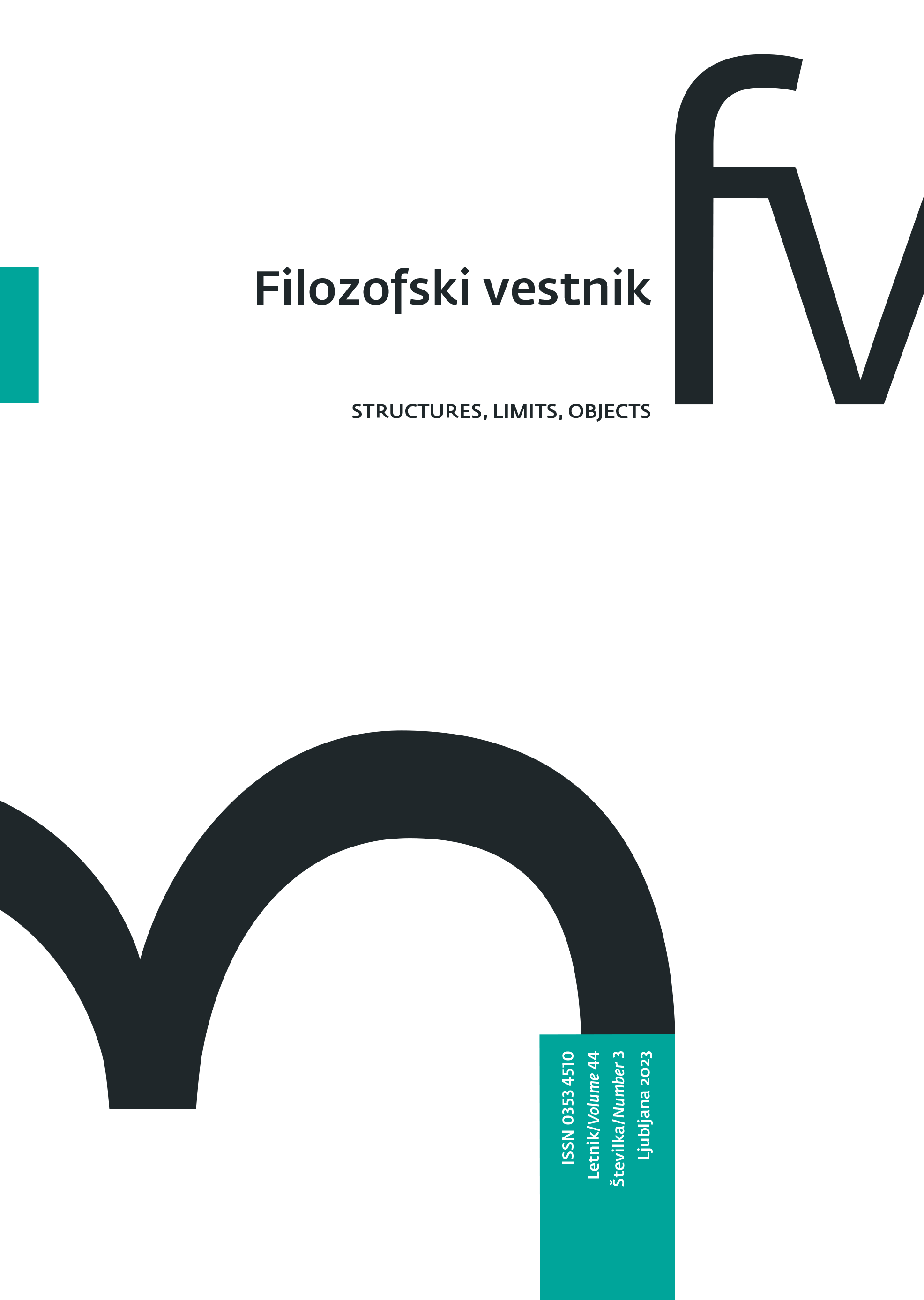Where Did the Unconscious Go?
An Approach to Freudian Metapsychology
DOI:
https://doi.org/10.3986/fv.44.3.01Keywords:
Freud, metapsychology, topography, unconscious, capitalist discourse, ChatGPT, pain, analytical experienceAbstract
It has been suggested that due to AI-technology-generated gadgets, a digital unconscious enables the probable annulment of the Freudian unconscious. The purpose of this article is to delve into Freudian topography as a way to demonstrate that this foreclosure of the unconscious was somewhat present in Freud as of 1920. In addition, regardless of solid attempts at the extinction of the unconscious by contemporary demands, I will focus on how the capitalist discourse and AI-generated technology propose a different form of social bond. Finally, the conceptualization of pain (Schmerz) is important for ascribing a different modality to the Freudian unconscious than in recent dissertations, but most importantly, it is a significant element for analytical experience to function properly where it must not be aligned with suffering. An era without an unconscious may foretell a time where enjoyment, as a form of subjectivity, is effaced.
Downloads
References
Bollas, Christopher. The Shadow of the Object: Psychoanalysis of the Unthought Known. London: Free Association, 1987.
Contri, Giacomo B., ed. Lacan in Italia, 1953–1978. Milan: La Salamandra, 2007.
Derrida, Jacques. “Freud and the Scene of Writing.” In Writing and Difference, translated by Alan Bass, 246–91. New York: Routledge, 2001.
Everitt, Katherine. “Does ChatGPT Enjoy?” The Philosophical Salon, May 15, 2023. https://thephilosophicalsalon.com/does-chatgpt-enjoy/.
Freud, Sigmund. “Draft G.—Melancholia.” In Pre-Psycho-Analytic Publications and Unpublished Drafts, 1886–1899, edited by James Strachey, 200–6. Vol. 1 of The Standard Edition of the Complete Psychological Works of Sigmund Freud. London: Hogarth Press, 1966.
Freud, Sigmund. “The Ego and the Id (1923).” In The Ego and the Id and Other Works, 1923–1925, edited by James Strachey, 3–66. Vol. 19 of The Standard Edition of the Complete Psychological Works of Sigmund Freud. London: Hogarth Press, 1961.
Freud, Sigmund. “Findings, Ideas, Problems.” In Moses and Monotheism, An Outline of Psycho-Analysis, and Other Works, 1937–1939, edited by James Strachey, 200–1. Vol. 23 of The Standard Edition of the Complete Psychological Works of Sigmund Freud. London: Hogarth Press, 1964.
Freud, Sigmund. “Inhibitions, Symptoms, and Anxiety (1926 [1925]).” In An Autobiographical Study, Inhibitions, Symptoms, and Anxiety, The Question of Lay Analysis, and Other Works, 1925–1926, edited by James Strachey, 77–175. Vol. 20 of The Standard Edition of the Complete Psychological Works of Sigmund Freud. London: Hogarth Press, 1959.
Freud, Sigmund. “The Interpretation of Dreams (1900).” In The Interpretation of Dreams (Second Part) and On Dreams, 1900–1901, edited by James Strachey, 339–627. Vol. 5 of The Standard Edition of the Complete Psychological Works of Sigmund Freud. London: Hogarth Press, 1953.
Freud, Sigmund. “Lecture XXXI—The Dissection of the Psychical Personality (1933 [1932]).” In New Introductory Lectures of Psycho-Analysis and Other Works, 1932–1936, edited by James Strachey, 57–80. Vol. 22 of The Standard Edition of the Complete Psychological Works of Sigmund Freud. London: Hogarth Press, 1964.
Freud, Sigmund. “Project for a Scientific Psychology (1950 [1895]).” In Pre-Psycho-Analytic Publications and Unpublished Drafts, 1886–1899, edited by James Strachey, 283–397. Vol. 1 of The Standard Edition of the Complete Psychological Works of Sigmund Freud. London: Hogarth Press, 1966.
Freud, Sigmund. “Repression (1915).” In On the History of the Psycho-Analytic Movement, Papers on Metapsychology, and Other Works, 1914–1916, edited by James Strachey, 141–58. Vol. 14 of The Standard Edition of the Complete Psychological Works of Sigmund Freud. London: Hogarth Press, 1957.
Freud, Sigmund. The Standard Edition of the Complete Psychological Works of Sigmund Freud. Edited by James Strachey. In collaboration with Anna Freud. Assisted by Alix Strachey and Alana Tyson. 24 vols. London: Hogarth Press, 1953–74.
Freud, Sigmund. “The Unconscious (1915).” In On the History of the Psycho-Analytic Movement, Papers on Metapsychology, and Other Works, 1914–1916, edited by James Strachey, 159– 215. Vol. 14 of The Standard Edition of the Complete Psychological Works of Sigmund Freud. London: Hogarth Press, 1957.
Gadamer, Hans-Georg. Schmerz: Einschätzungen aus medizinischer, philosophischer und therapeutischer Sicht. Heidelberg: Winter, 2003.
Gamwell, Lynn, and Mark Solms. From Neurology to Psychoanalysis: Sigmund Freud’s Neurological Drawings and Diagrams of the Mind. Binghamton, New York: Binghamton University Art Museum, 2006.
Lacan, Jacques. The Ego in Freud’s Theory and in the Technique of Psychoanalysis, 1954–1955. Translated by Sylvana Tomaselli. The Seminar of Jacques Lacan, edited by Jacques-Alain Miller, book 2. New York: W. W. Norton, 1991.
Laplanche, Jean, and J.-B. Pontalis. Vocabulaire de la psychanalyse. Paris: Quadrige, 1984.
Murphy, Mark G. “E-scaping Responsibility and Enjoyment through ChatGPT: A New Unconscious?” In Psychoanalysis and ChatGPT, edited by Alfie Brown, 15–20. London: Everyday Analysis Free Press, 2023.
Nancy, Jean-Luc. Corpus. Translated by Richard A. Rand. New York: Fordham University Press, 2008.
Recalcati, Massimo. L’uomo senza inconscio: Figure della nuova clinica psicoanalitica. Milan: Rafaello Cortina Editore, 2010.
Rouselle, Duane. “ChatGPT, From a Window in Baltimore.” In Psychoanalysis and ChatGPT, edited by Alfie Brown, 51–58. London: Everyday Analysis Free Press, 2023.
Rouselle, Duane. “Escaping the Meta-Verse, Or ‘Forgiveness for the Artificially Intelligent?’ ” In Psychoanalysis and ChatGPT, edited by Alfie Brown, 9–14. London: Everyday Analysis Free Press, 2023.
Scarry, Elaine. The Body in Pain: The Making and Unmaking of the World. New York: Oxford University Press, 1985.
Žižek, Slavoj. “ChatGPT Says What Our Unconscious Radically Represses.” In Psychoanalysis and ChatGPT, edited by Alfie Brown, 21–25. London: Everyday Analysis Free Press, 2023.
Žižek, Slavoj. Living in the End Times. London: Verso, 2011.
Žižek, Slavoj. “Philosophy, the ‘Unknown Knows,’ and the Public Use of Reason.” Topoi 25 (September 2006): 137–42. https://doi.org/10.1007/s11245-006-0021-2.
Downloads
Published
How to Cite
Issue
Section
License
Copyright (c) 2023 Authors

This work is licensed under a Creative Commons Attribution-ShareAlike 4.0 International License.
Authors guarantee that the work is their own original creation and does not infringe any statutory or common-law copyright or any proprietary right of any third party. In case of claims by third parties, authors commit their self to defend the interests of the publisher, and shall cover any potential costs.
More in: Submission chapter





